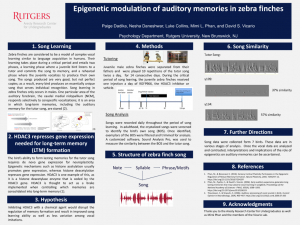Dadika, Paige: Epigenetic Modulation of Auditory Memories in Zebra Finches
Title: Epigenetic Modulation of Auditory Memories in Zebra Finches
Name: Paige Dadika
Major: Cognitive Science
School affiliation: School of Arts and Sciences
Programs: Aresty Summer Science Program
Other contributors: Nesha Daneshwar, Luke Collins, Mimi L. Phan, and David S. Vicario
Abstract: The zebra finch brain is thought to be a model system of complex vocal learning. There are multiple brain areas involved, and certain epigenetic mechanisms are thought to control this process that closely resembles human speech acquisition. Successful vocal imitation depends on a combination of sensory memory, motor learning, and underlying neural development. During an early critical period, songbirds memorize the song of an adult tutor and through vocal practice, match their vocalizations to the tutor song memory. The bird’s ability to form lasting memories for the tutor song requires de novo gene expression for neuroplasticity. Epigenetic mechanisms such as histone acetylation usually promotes gene expression, whereas histone deacetylation represses gene expression. Here, we hypothesize that inhibiting HDAC3, a histone deacetylase enzyme that is coded for by the HDAC3 gene, with RGFP966 would disrupt the regulation of memory formation and result in changes to the type of information about the tutor song which is consolidated into long-term memory. To test this, zebra finches were exposed to 10-20 repetitions of the tutor song and then immediately injected with an HDAC3 inhibitor or with vehicle. Electrophysiology testing was used to determine the strength of the neuronal memory of the tutor song. Birds treated with the chemical agent were shown to have a significantly higher familiarity index of the songs than the vehicle group. These findings indicate that HDAC3 acts as a brake when regulating the songs allowed into long-term memory and so epigenetic mechanisms do contribute to plasticity in zebra finch brains.
